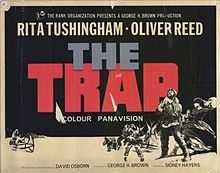The Trap (1966 film)
| The Trap | |
|---|---|
 | |
| Directed by | Sidney Hayers |
| Produced by | George H. Brown |
| Written by | David D. Osborn |
| Starring |
Rita Tushingham Oliver Reed |
| Music by | Ron Goodwin |
| Cinematography | Robert Krasker |
| Edited by | Tristam Cones |
Production company |
George H. Brown Productions |
| Distributed by | J. Arthur Rank Film Distributors |
Release dates | 15 September 1966 (World Premiere, London) |
Running time | 106 minutes |
| Country |
Canada UK |
| Language | English |
The Trap is an adventure/romance film released in 1966, written by David D. Osborn and directed by Sidney Hayers. Shot in the wilderness of the Canadian province of British Columbia, Oliver Reed and Rita Tushingham star in this unusual love story about a rough trapper and a mute orphan girl. The soundtrack was composed by Ron Goodwin and the main theme (Main Titles to The Trap) is familiar as the title music used by the BBC for London Marathon coverage.
The film had its World Premiere on 15 September 1966 at the Leicester Square Theatre in the West End of London.
Plot
Fur trapper Jean La Bête (Oliver Reed) paddles his canoe through wild water towards the settlement in order to sell a load of furs. At the settlement, a steamboat is landing and the trader and his foster-child Eve (Rita Tushingham) arrive at the seaport to fetch mail and consumer goods. The trader explains to Eve that the ship brings "Jailbirds ... from the east" and that "their husbands-to-be had bailed them out and paid their fines and their passages with a guarantee of marriage". Later, the captain is auctioning off one of those women because her husband-to-be has died in the meantime. Jean La Bête decides to take his chance to buy the wife, but he makes his bid too late.
Next day, the trader's wife, in the need to compensate for the loss of her savings, seizes the opportunity to offer her foster-child for a thousand dollars to the simple-minded, rough-cut trapper. She praises the qualities of the shy girl and explains, that her inability to speak is caused from the shock she suffered when she had to witness how her parents were barbarously murdered several years ago.
La Bête finally agrees to buy the mute girl and takes her against her will into the wilderness of British Columbia. Here the strange couple starts a difficult relationship characterized by mistrust and Eve's fear and dislike of the trapper. Eve vehemently rejects the advances of the gruff trapper. La Bête takes her for hunting and acquaints her with the beauty and the dangers of the wilderness, but here, as well, he fails to win her trust. The lonely trapper still spends the nights alone in his bed.
One day, on checking his traps for caught animals, La Bête is threatened by a mountain lion. He successfully shoots the cat but inadvertently gets his foot into his own bear trap. Badly injured, he tries to drag himself back to his hut, hunted by famished wolves. Meanwhile, Eve is waiting at the cabin and hears the distant howling of the wolves approaching the hut. Equipped with a gun she sets out in search for La Bête, and together they can get rid of the wolf pack.
La Bête's lower left leg is broken, so he asks Eve to bring the medicine man from the next Indian village, a two days trip away. The Canadian winter has already come, so Eve puts on her snowshoes, and starts a long, arduous walk over snow covered hill tops. She finally reaches the village only to find it totally deserted.
Returning empty-handed, Eve finds La Bête already suffering from blood poisoning. Having no time to lose, he urges the terrified girl to immediately chop off his poisoned leg using an axe. After La Bête has stunned himself by gulping the last drop of rum, Eve acts as commanded and her patient instantly passes out from pain. Eve succeeds in saving the trapper's life in the following period of nursing. In that time she has learned to hunt on her own and is now capable to provide for the couple. Eventually they become intimate, the hobbled trapper no longer appears that gruesome to Eve.
But her childhood trauma is still keeping her from staying with the trapper and consequently, she flees with a canoe back to the settlement.
Here, although being welcome, she remains an outsider. Even the impending marriage to a sympathetic young man cannot overcome her inner barriers.
On the day of marriage, she runs away again in order to finally return to the man she's come to love, Jean La Bête. In the last scene, she starts chopping wood while watching La Bête hobbling into the forest to hunt and singing a song taught by his mother
"When I'm a man, I'll take me a wife; We'll live in a house on the hill, the hill; With carriage and horses all white, all white; And she shall have diamonds and pearls, and pearls; And she shall have diamonds and pearls"
Cast
- Rita Tushingham as Eve
- Oliver Reed as Jean La Bête
- Barbara Chilcott as the Trader's Wife
- Rex Sevenoaks as the Trader
- Linda Goranson as the Trader's daughter
- Merv Campone as Yellow Dog
- Reginald McReynolds as the Captain
- Joseph Golland as Baptiste
- Walter Marsh as the Preacher
- Blaine Fairman as the Clerk
External links
| ||||||